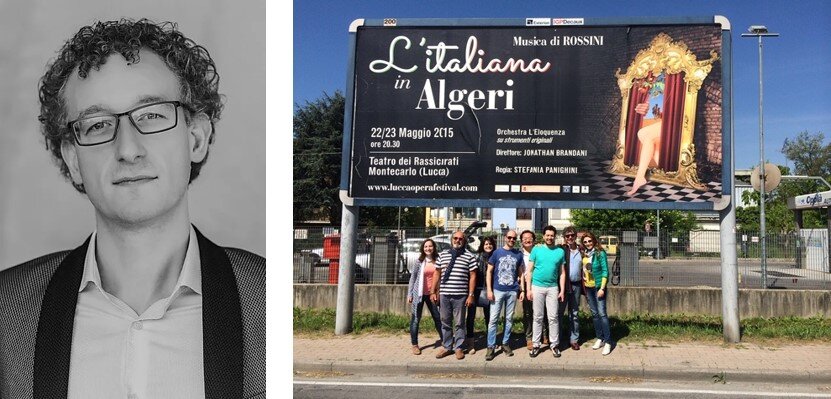Napoli Milionaria Opera at Teatro Giglio, Lucca
Eduardo De Filippo, Nino Rota and Jonathan Brandini
March 2020
Napoli Milionaria is an opera in three acts based on a 1945 play of the same name by Eduardo De Filippo (1900-1984) who also wrote the libretto to the opera. De Filippo was also responsible for the 1950 film Side Street Story (based on his play) which he wrote, directed, acted and co-produced with the famous Italian film producer Dino De Laurentiis (1919-2010). The film, first shown in 1951 at the Cannes Film Festival, also starred the great Italian comic actor Antonio De Curtis better known as Totò (1898-1967). The music for both the film and the opera was composed by Nino Rota (1911-1979) who is perhaps nowadays most famous for composing much of the music for the first two films of Francis Ford Coppola’s trilogy The Godfather for which he shared an Academy Award (an Oscar) in 1972 for Godfather Part II with the director’s father Carmine Coppola.
Left: Eduardo De Filippo Right: Nino Rota
Napoli Milionaria first premiered at the Teatro Caio Melisso in Spoleto, Umbria in 1977, conducted by Bruno Bartoletti (1926-2013) from Florence during the Festival dei Due Mondi. Based on Side Street Story, the opera is a combination of satire and comedy of ordinary people living in crisis in Naples during WWII. The streets are dominated by Fascists, Nazis and finally the Allied occupation forces of Britain and America having to survive on the ‘black market’. The opera is part of the L.T.L.OperaStudio project between the Teatro Giglio Lucca, the Teatro di Pisa and the Teatro di C. Goldoni di Livorno and will be performed in Lucca on 14 and 15 March 2020 by the OGI, the Orchestra Giovanile Italiana.
Eduardo De Filippo was born in Naples in 1900 where he was the illegitimate son of comedy actor Eduardo Scarpetta (1853-1925). Eduardo took his mother’s surname Luisa De Filippo who was a theatre seamstress and costumier. He began acting aged five and by 1932 had formed a theatre company with his brother Peppino and sister Titina and after WWII was able to buy the San Ferdinando theatre in Naples. His legacy as an actor and director was inherited by his son Luca (1948-2015) who became a successful Italian film and television actor.
Nino Rota was born in 1911 into a musical family from Milan and was a child prodigy composing his first oratorio L’infanzia di San Giovanni Baptista (The Childhood of Saint John the Baptist) at the age of eleven. During his long career, he became well-known for his numerous (over 150) film scores working with the great Italian film directors Federico Fellini (1920-1993), Luchino Visconti (1906-1976) and Franco Zeffirelli (1923-2019). Rota also composed the music for ten operas, five ballets and numerous orchestral, choral and chamber music. He was also a musical academic having become the director of the Liceo Musicale in Bari for nearly thirty years. It was after meeting with Arturo Toscanini that Rota was encouraged to move to America. Amongst his other great film scores were The Glass Mountain (1949), La Dolce Vita (1960), Il Gattopardo (1963) and Romeo and Juliet (1968).
Jonathan Brandani is a Lucchese born conductor who will be conducting Napoli Milionaria in Lucca, Pisa and Livorno this year. Since 2014, Jonathan has been Associate Conductor of Minnesota Opera, where he has conducted Puccini’s Tosca and La Bohème, Donizetti’s Don Pasquale and Nino Rota’s Il cappello di paglia di Firenze (often titled The Italian Straw Hat). As someone I have known as a friend and admired since 2015 when he conducted Rossini’s L’italiana in Algeri, I can highly recommend reading Jonathan’s biography www.jonathanbrandani.net to fully appreciate his talent and achievements.


